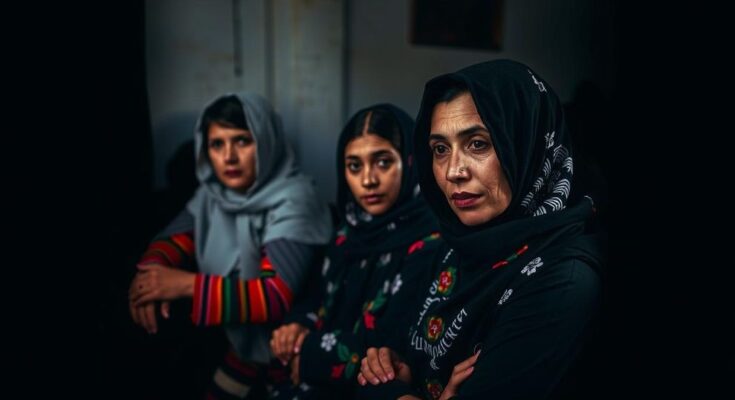The resurgence of the Taliban in Afghanistan has led to severe human rights violations against women, stripping them of education, employment, and mobility. With over 14 million women affected, Afghanistan is declared the worst country for women’s rights, suffering economic decline and rising rates of poverty. Child marriages are increasing as girls are denied education, and protesting women face brutal repression. Despite international condemnation, the Taliban’s impunity continues, underlining the urgent need for global action to support Afghan women’s rights.
As the shadows lengthen over Afghanistan, the plight of women grows ever darker, with dire human rights violations reaching alarming levels since the Taliban’s resurgence in 2021. The systematic erasure of liberties—including bans on education, employment, and mobility—has plunged millions of women into despair. Prisons of control have replaced once vibrant lives, with economic independence slashed and communities fractured. The relentless grip of Taliban edicts has rendered Afghan women largely voiceless, leaving them to navigate a landscape devoid of autonomy, where every hope for the future hangs by a thread. Following the Taliban’s takeover, more than 14 million women saw their fundamental rights snatched away, plunging Afghanistan into a realm of social repression deemed the worst in the world for women’s rights. Economic downturns followed swiftly as job opportunities vanished, with a staggering 96% of the population now teetering on the edge of poverty. The ban on women from participating in the workforce has led to closure of women-owned businesses, robbing them not only of income but also of vital social support. Heather Barr of Human Rights Watch poignantly notes that, “This isn’t about getting your hair and nails done. This is about 60,000 women losing their jobs.” It’s a bitter irony that while girls worldwide pursue knowledge and opportunity, Afghan girls face confinement, barred from education entirely. With nearly 2.5 million girls deprived of schooling, Afghanistan stands alone as the only nation to prohibit women from secondary and higher education. UNICEF highlights the profound loss, stating, “One thousand days out of school amounts to 3 billion learning hours lost.” Yet, the implications extend beyond education; they foreshadow generations of lost potential, mental health crises, and rising child marriages as desperation mounts. The Taliban’s harsh impositions also strip away the freedom of mobility for women, confining them within domestic walls unless accompanied by a male guardian. Edicts demanding head-to-toe coverings serve not merely as clothing requirements but as shackles binding women to an existence of invisibility. Khaled Hanafi, the acting minister for morality under Taliban rule, deflects criticism by claiming, “we want our sisters to live with dignity and safety,” while the reality belies this statement. Amidst this turmoil, women who dare to speak out face brutal repercussions, with protestors experiencing enforced disappearances and torture. The gripping narrative unfolds as Afghan women like Nausheen recount harrowing tales of their detentions, illustrating the chilling consequences of dissent. “When we were released from detention we were not the same people as before,” she recalls, shedding light on lives fractured by fear. Today, the call for accountability echoes loud yet unanswered in the international arena. The UN bears witness to the atrocities, yet impunity reigns supreme as the Taliban tighten their hold. Richard Bennett warns of the dire consequences of ignoring these violations for both Afghan society and global stability, urging recognition of the extreme oppression as a crime against humanity. “Failure to effectively tackle the cycle of impunity only emboldens the Taliban’s oppressive regime,” he asserts, encapsulating the urgent need for global intervention before all hope extinguishes altogether. In this heartbreaking tale of persistence against relentless oppression, Afghan women continue to fight for their rights, their voices rising against a backdrop of suffering. The brutal reality they endure starkly contrasts with the ideals of freedom and dignity, calling upon the world to act decisively. Perhaps through this collective outcry, one day, the sun will shine upon Afghanistan once more, illuminating not just survival, but the flourishing of hope and dreams for all women.
The situation in Afghanistan, particularly for women, has deteriorated sharply since the Taliban’s resurgence in 2021. Following decades of struggled gains in women’s rights and freedoms, the Taliban’s return marked a swift regression into severe social oppression. With education, work opportunities, and mobility stripped from women, the humanitarian crisis has deepened, prompting global attention and concern. This report encapsulates the ongoing violations, drawing on expert opinions and data to illustrate the urgent need for international support and intervention.
The grim reality faced by Afghan women under Taliban rule paints a compelling picture of oppression marked by violence, silence, and lost freedoms. Through systemic discrimination and widespread violations of human rights, millions of women find themselves trapped in an unending cycle of despair. Yet amid all this darkness, Afghanistan’s women continue to fight resolutely for their rights, underscoring the need for the international community to respond swiftly and effectively to restore their dignity and autonomy. Only through concerted efforts can hope for a brighter future prevail in Afghanistan once more.
Original Source: www.ipsnews.net



